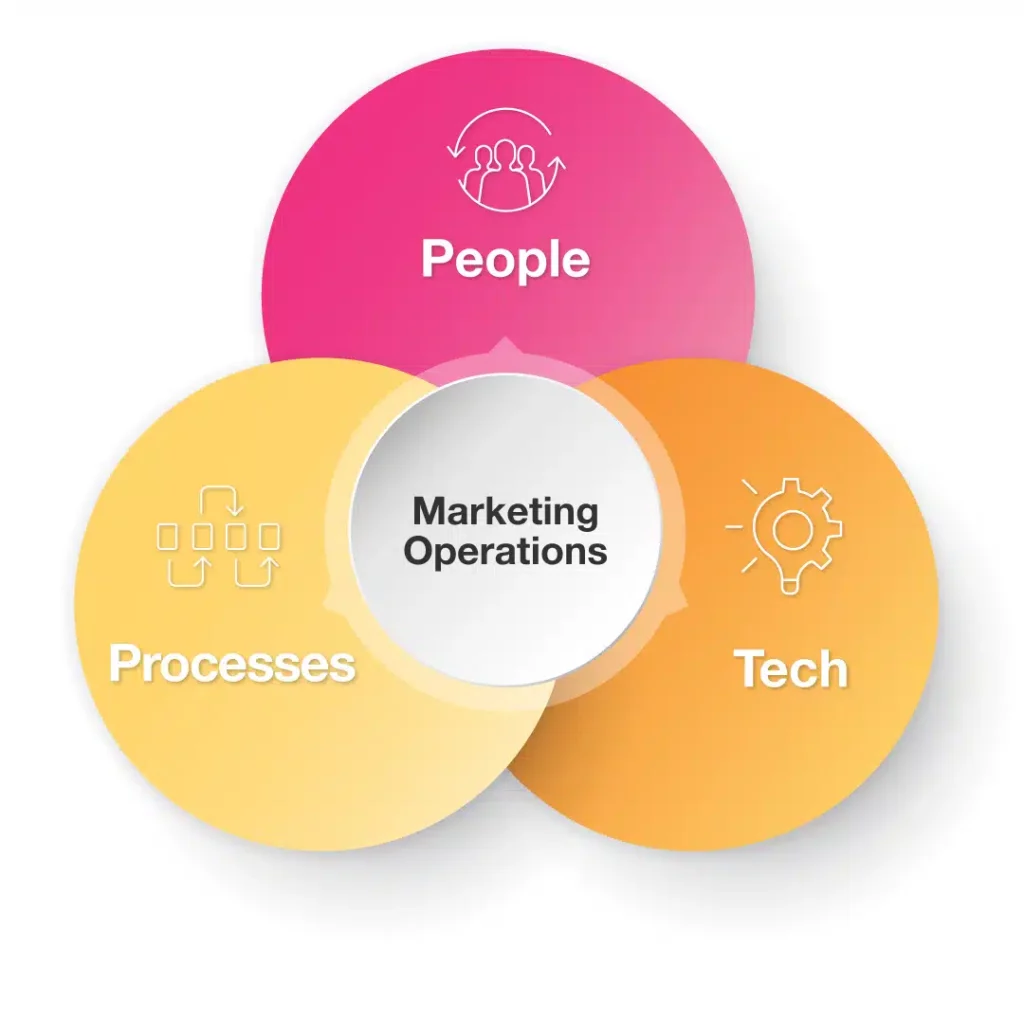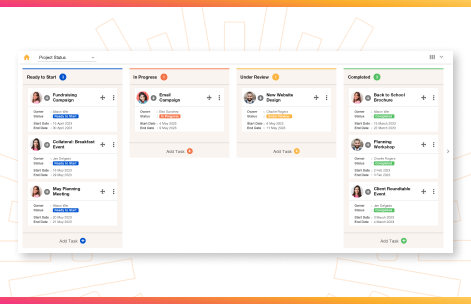What is Marketing Operations?
Marketing operations is where the People, the Processes, and the Technology come together in the execution of creative production and campaigns.

People
Your team’s skills and expertise may include marketing managers, analysts, designers, content writers, SEO experts, brand experts and external agencies. The role of marketing ops is to help people hit their goals and their deadlines.
Processes
Well designed processes can help your team streamline every step, from ideation to creation and execution. Robust processes can prevent costly mistakes and ensure brand and legal compliance.
Technology
With the right tools, you can create, manage and track every step in the go to market process effectively. The role of marketing ops is to configure the technology to streamline the processes in a way that helps the people achieve their goals.
Benefits of Marketing Operations Software?
Improved Quality
Help teams uphold better standards for accurate, consistent and impactful campaigns with a structured process.
Faster Production
Help teams produce and approve quality creative work faster.
Save money
You gain efficiencies when reducing cycles between people and processes, using marketing technologies to streamline campaign development.
Happy Teams
Systems can automate admin, create transparency, and promote accountability, allowing teams to focus on what’s important.
More Sales
More effective campaigns (and more of them) can lead to more awareness and higher conversion of sales.
Less Marketing Risk
Effective marketing operations prevents your team launching work that’s off brand or breaches legal compliance, removing the risk of regulatory fines.
How Marketing Operations Software works?

Managing Briefs
Up to a third of marketing budgets are wasted on bad briefs. This amounts to $200bn in global ad spend. When well designed Briefs (Master Briefs, Campaign Briefs and Task Briefs) are at the core of your marketing operations, you have the ability to ensure everything aligns with your strategy, projects are budgeted and approved, and all actions are tracked. Marketing Operations Software keeps all this information together.

Brand Management
70% of marketing teams say their work is subject to at least one type of brand or industry requirement. Marketing Operation’s role is to set-up workflows that ensure brand and legal compliance. Marketing Operations Software includes brand management functionalities such as Online Brand Guidelines (no more out of date PDFs), Access Control for assets, and Approval Workflow to ensure everything is authorized.

Task Management
Managing projects is easier when every task is tracked with a description, due date, and a person assigned responsibility. Visualize, prioritize and co-ordinate projects using Kanban Boards and Calendars.

Process Management
83% say their teams are less efficient due to not having the right processes in place. Marketing Operations software streamlines the Proofing and Approval process. Reduce email chaos by replacing email requests (e.g. can I have a logo) with a Marketing Inbox, that allows users to request help in a more transparent way, and even what they need with self-service. Disclaimer Engines can generate the necessary legal approved disclaimers at the start of the project, rather than once the creative is made.

Creative Automation
Creative Templates automate creative production by allowing non-marketers to personalize or localize marketing collateral using brand approved, locked down templates. Instantly populate selected fields (such as locations, product names, staff details), and empower your team to localize their own brand-approved collateral, while your skilled designers focus on creating new creative.

Digital Asset Management
90% of marketing material is never put to use because it’s not relevant, out-of-date, or not accessible. Your Digital Asset Management (DAM) platform should be at the heart of your marketing operations software. A good DAM will save your organization time and money, making everything easier to find and share, with a single-source of truth.

Marketing Compliance
Marketing Operations software helps teams stay on brand (brand compliance), and also ensure legal compliance (including industry regulations). Marketing Operations software will help you track Approvals (brand and legal), brand and legal checklists, and manage disclaimers. Marketing Operations software also includes the tools to ensure organizations are only using Approved content (never expired assets), and includes easy access to audit trails. For regulated industries, compliance features are a must.

MarTech Management
Marketing Operations software should be easy to adapt to your business and your changing requirements, people and processes. There is no single marketing platform that does it all, so we recommend integrating your Marketing Operations software throughout your MarTech stack – including your website, content creation tools such as Photoshop and Office, your CRM, your project management tools, and your communications tools.
Choosing a Marketing Operations Platform
Choosing the right Marketing Operations Platform may feel overwhelming. Below is an overview of key considerations that will help you confidently choose the best marketing operations software for your team.
How does pricing work?
Pricing typically depends on the number of seats, features/modules required, and the amount of data storage and transfer used as part of your Digital Asset Management system. Quality support services are an important consideration because they can fast track the configuration of your changing processes, streamlining time to value. Typically, packages start from 25 users onwards.
Is Marketing Operations Software easy to learn and configure?
It certainly can be. It starts by understanding your current processes, and ways to improve those processes. Learning the technology is easy once you understand the configuration you need.
Why is Marketing Compliance so important?
Marketing compliance refers to regulatory laws that protect consumers from being misled by businesses. Examples include the FTC, which have recently issued nearly 700 companies with notices warning of the consequences they could face if they cannot substantiate their advertising claims. Different counties (and different industries) may have different regulatory requirements. For Banking and Finance, that may include FINRA, SEC and DDO marketing compliance frameworks. For Healthcare it may be HIPPA, and Pharmaceuticals the FDA. GDPR and CPPA are examples of data protection laws that must be followed. Marketers today face increasing regulations along with increasing pressures to get work done faster. Marketing Operations Software should be your go to technology to ensure all your processes are optimized and brand and regulatory requirements are followed.
Is one platform better than many?
There are few Marketing Operations Platforms that solve every marketing operations challenge, however the more connected your technology, the easier managing the process will be. For example, managing branding, briefs, tasks, proofing and approvals within a single platform that is connected to your DAM can replace half a dozen other platforms, giving you more control to simplify your processes.
Does Marketing Operations Software integrate with other MarTech platforms?
Look for a vendor that makes it easy to connect your Marketing Operations Platform with the tools your team already use. This includes integration with creative apps (e.g. Photoshop, Illustrator, In Design, Figma), productivity apps (Microsoft Office and Google Docs), and CMS platforms (WordPress, Drupal, Contentful). It is also beneficial to integrate processes with other project management tools such Trello, Jira, Asana, Dropbox. Look for a vendor that also offers deeper integrations with API access.
How configurable is the platform?
Every organization has their unique set of people, processes and technical systems. Your Marketing Operations Software should adapt to your team and industry, not the other way around. You should be able to customize fields, workflows, as well as the look and feel of your platform. Evaluate how easy these configurations really are – is it a simple settings adjustment, or does it require custom coding?
How secure are Marketing Operations platforms?
Ensure your Marketing Operations Software vendor takes privacy and security seriously. Make sure you find out what encryption and security protocols are used, and where your data will be stored. Your selected platform should include access permissions and controls, data storage at ISO 27001, SOC2 compliant data centers, HIPPA compliance, 2-Factor Authentication, firewall protection, login rules, proactive monitoring, penetration testing, and last but not least data ownership (you should always own your own data) and easy data retrieval. A reputable Marketing Operations Platform provider shouldn’t hesitate to discuss security and data protection.
Do they offer ongoing customer service?
Choose a trusted vendor with an established record of providing services to major brands. Marketing Operations is an ongoing process, not just a one-time installation. Your selected vendor will provide ongoing customer care from an experienced in-house support team.




